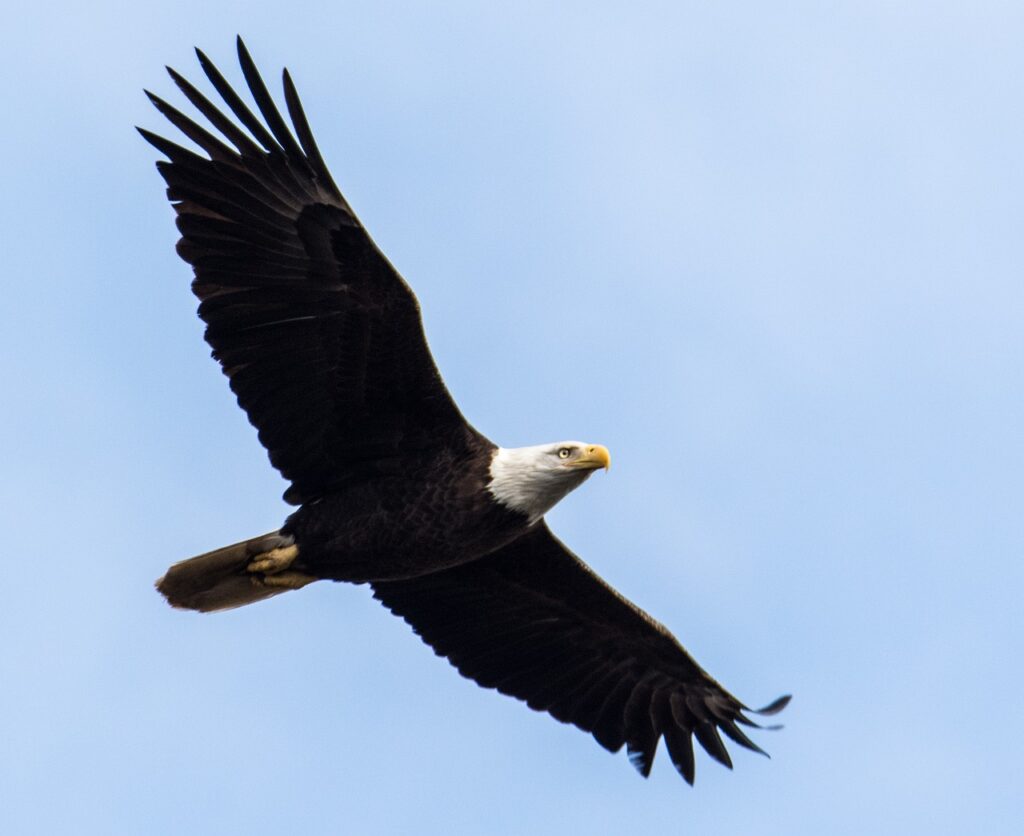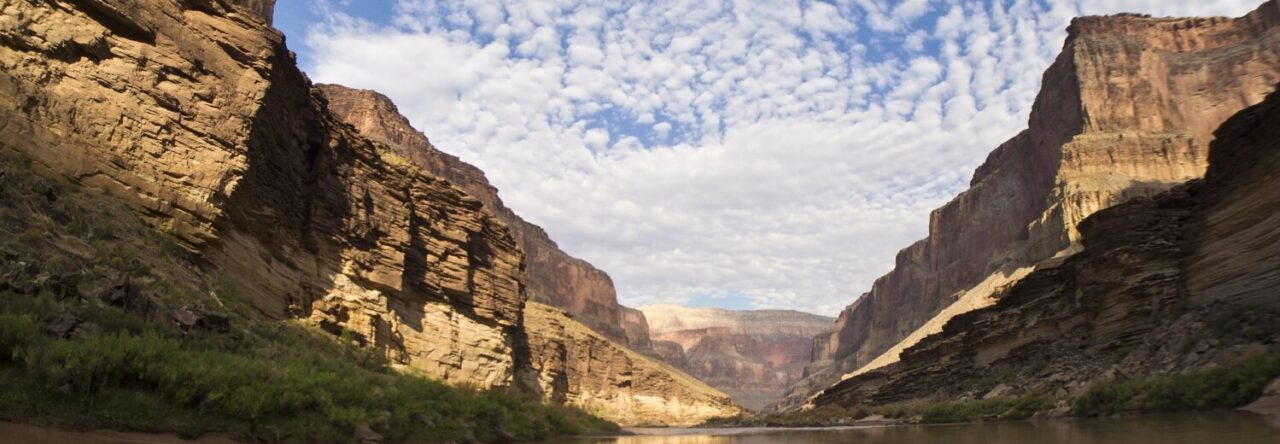
“‘Do you give the horse its might?
Do you clothe its neck with mane?”…
“‘Is it by your wisdom that the hawk soars
Job 39:19 & 26-27 NRSVUE
and spreads its wings toward the south?
Is it at your command that the eagle mounts up
and makes its nest on high?”
2023 marks the 50-year anniversary of both the Endangered Species Act (abbreviated “ESA”) and Secretariat’s famous triple crown win. If you’ve seen the movie, you know Secretariat opens with the passage from Job quoted here, albeit using a different translation and highlighting some different lines. In a more dramatic scene than this post, it depicts a horse that “laughs at fear, afraid of nothing” and “cannot stand still when the trumpet sounds.” Job 39:19-25 (NIV). That scene, and this passage, came first to mind in thinking about the anniversary and some political attacks on its future.
These verses evoke the majesty and mystery of creation. They also remind us that it is by His wisdom, and with His intimate familiarity that the intricacies of the natural world exist—not our own.
In the 1970s, when Congress passed the Endangered Species Act with broad bipartisan support, then-President Nixon evoked the language of stewardship and generational blessing in signing it into law.[1] Polls still show strong public support, across party lines.[2] Why should this still matter to us now, especially if other issues are also a concern? Among other reasons:
Humility
O LORD, what a variety of things you have made! In wisdom you have made them all. The earth is full of your creatures.
Psalm 104:24
“By wisdom the LORD founded the earth…,” Proverbs 3:19, including the rich diversity of life. In so doing, He did not make the world “a chaos, he formed it to be inhabited,” imbuing order into what He had made. Isaiah 45:18-19 (NRSV).
In preparing for the flood and reestablishment, God directed Noah to conserve animal species that would otherwise perish on the ark, specifically instructing “to keep their kind alive on the face of all the earth.” Genesis 7:3.
We may not understand how a particular species fits into the created order or has relationship to our own survival or wellbeing, if at all. We know, however, that “God opposes the proud but gives grace to the humble.” James 4:6 (ESV); see also Proverbs 3:34; 1 Peter 5:5. We see in the scriptures that creation has value to God. As also illustrated to Job in the passage above, care and intentionality went into each. Why would we second-guess, or fail to protect, the gift we received?
Artistry
John Eldredge describes creation as “epic and intimate,” filled with “beauty and attention to detail.”[3] His book Beautiful Outlaw urges people to remember that “the heart of the artist is revealed in their work,” and ask how the personality of Jesus “leaks through” in the creatures He made.[4] Examples to ponder include, among others, polar bear cubs, who “hurl themselves down snowy hillsides headfirst and upside down, just for fun” and otters playing tag.[5] Both polar bears and some types of otters (sea otters) are listed as threatened under the Endangered Species Act. If we lost them, how would future generations answer to those questions?
Apart from specific examples, the availability and rich variety of plant and animal life speaks to the abundance and generosity of God.[6] Presently, with biodiversity in crisis, news sources cite an almost 70% decline in wildlife populations, along with heightened extinction risk.[7] That risk extends to almost 30% of mammals, a fifth of birds, and other living things, including, at highest risk, certain, ancient seed-bearing plants.[8] What would that mean for our perception as well?
Practicality & Fidelity
The U.S. Department of State highlights the global loss of biodiversity as “an existential threat to livelihoods, food systems, and health.”[9] Turning that tide has practical implications, while also comporting with Biblical principles.
As believers, the lifestyle to which we are called is not one of all-consuming grasping at every available resource. Principles of gleaning, for example, provide that that instead of reaping a field “right up to its edge,” and “strip[ping a] vineyard bare,” landowners are to leave behind a form of provision “for the poor and for the sojourner.” Leviticus 19:9-10 (ESV); see also Leviticus 23:22. Leaving a forgotten sheaf in the field “for the stranger, for the orphan, and for the widow,” instead of returning to gather it is both for their benefit and “so that the Lord your God may bless you in all the work of your hands.” Deuteronomy 24:19 (AMP). Similarly, instead of working at every possible hour, the rhythm of life God provides entails remembering the sabbath and keeping it holy. See Exodus 20:8-11. Instead of lack, our confident trust in God as our source and obedience to his commands brings abundant provision and blessing. See Deuteronomy 28. Compare also Proverbs 23:4 (BSB) (“Do not wear yourself out to get rich; be wise enough to restrain yourself.”).
In a similar vein, but secular context, Charles Wilkinson wrote that: “The Endangered Species Act also benefits the human race, and not just by achieving pragmatic objectives,’ but by “pull[ing] out the best in us” and “elevat[ing] us by its proof that our unique ability to develop technology is coupled with the capacity and will to exercise a humane restraint in the name of a high calling.”[10]
***
Someone once told me that she loves the Secretariat movie because it is pure victory. We have seen notable successes with the Endangered Species Act as well, including recovery of our national symbol, the bald eagle. Following this anniversary, may we continue to go, as Pastor Mark says, from victory to victory.
[1] Statement on Signing the Endangered Species Act of 1973. | The American Presidency Project (ucsb.edu)
[2] See, e.g.., Support for the Endangered Species Act remains high as Trump administration and Congress try to gut it | PBS NewsHour
[3] John Eldredge, Beautiful Outlaw: Experiencing the Playful, Disruptive, Extravagant Personality of Jesus, at 19 & 57 (FaithWords 2011).
[4] Id. at 62.
[5] Id. at 19-20, excerpt available at See the Artist by His Artistry | Wild at Heart.
[6] Id. at 56-66.
[7] The biodiversity crisis in numbers – a visual guide | Cop15 | The Guardian
[8] Id.
[9] Highlighting U.S. Efforts to Combat the Biodiversity Crisis – United States Department of State
[10] Charles Wilkinson, The Eagle Bird: Mapping a New West, at 139-40 (Johnson Books 1999).

